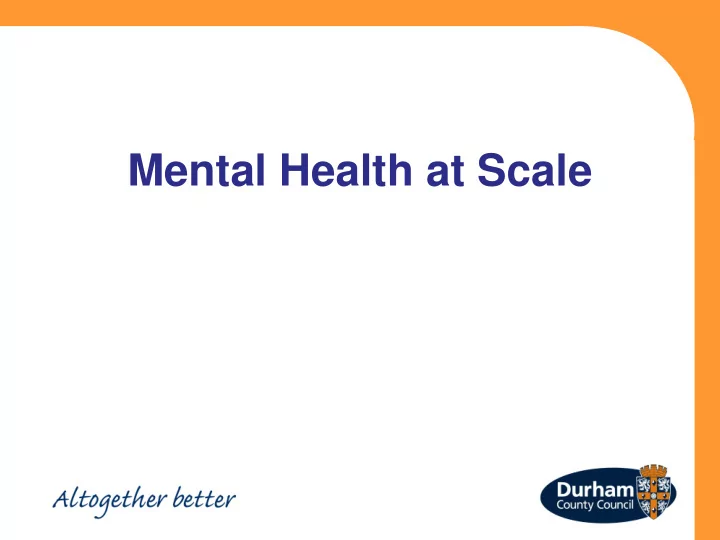

Mental Health at Scale
Our priorities 2018 - 2020 Positive behaviour change – smoking, activity Every child Our and food to have the healthy best start workforce in life Mental Health at scale Better quality Good jobs of life and places through integrated to live, learn Excellent health and and play drug and care services alcohol service provision
County Durham Partnership Priority • Overall Prioritising Prevention agenda • Four main areas • Scaling Up Best Practice • Maximising Funding • Reducing the Demand for Services • Prevention at Scale – Mental Health – supported by the Local Government Association
LGA Prevention at Scale Programme The offer • Areas assigned a Support Manager and an LGA Adviser for guidance • Networking and masterclasses • Areas will have up to 20 days expert support • ‘Expertise’ can be as innovative as the LGA can procure • peer-led/learning from elsewhere • provided by the Support Manager • procured through the LGA e.g. Design Council, Behavioural Insights; digital expertise • External evaluation
Our approach • Reducing deaths by suicide with a focus on workforce, anti-stigma and discrimination • Interventions build progressively from community level into work with specific target groups.
Our Workforce • Workforce Leads meeting held Autumn 2018 • Many public sector organisations included • Explore current approaches to provision • Co-operative approach to training to be shared • Is there a County Durham toolkit? • Using existing evidence and good practice e.g. Public Health England • Culture, policy, workforce development
Mapping training against competencies
Our workforce
Scope of work - workforce • To be cogniscent of the distinct needs of the five workstreams • Identify key stakeholders working in this field. • To take into consideration any competency frameworks and national policy guidance on mental health workforce development • To review current best practice locally and nationally • To review the range of current initiatives being taken forward across the North East by partners in the public (and VCSE and private sector) • To explore the potential to pool resources across partners.
Behavioural Insights • Programme of reviewing the evidence locally and nationally, and local insight through stakeholders and residents. • 1:1 interviews with six key stakeholders • Session with men’s groups (community group, public sector and private sector workforce) • Through schools (one SEND school, one YAM school and one secondary school) • Follow up 1:1s with GP, floating support and HR manager • Wider community work – awaiting feedback from the initial phase – will inform social movement and time for change
Early thoughts • In addition to the ‘known’ risk factors, stakeholders also suggest social isolation, interactivity, self image/pride (in both aspiring to be ‘someone’ and expectations of how ‘life has turned out’.) • Hobbies that exacerbate social isolation e.g. gaming and ‘surface level’ socialising at the pub rather than engaging in activities that foster meaningful networks / relationships. • ‘Bad’ coping strategies, such as drinking too much, to ‘escape’ feelings.
Barriers • Belief that only CAMHS / formal mental health services will help and that anything else equates to being ‘fobbed off’. • Stigma - for both groups and for population in general. Stigma not confined to mental health problems - any sign of ‘weakness is stigmatised especially for employed men 40-49 or young people from particularly tough backgrounds. • Mistrust and fear. For both target populations there is the issue of whether they trust that seeking help will be treated in confidence.
Design Council workshop
Design council
8 Principles of Social Movement Cree’s are built based on need and community development Grant Networks giving Assets within No KPIs communities to bring and share
Participatory budgeting Sharing Natural toolbox alliances Crees sharing back learning Public Sector: accepting this as an approach Crees: reduce Time to dependency Change Network events Legitimacy Cross site of Cree learning voice and participants are community
Time to talk day DCC is committed to changing the culture and stigma negatively associated with mental health and ensure that staff feel that can talk openly about mental health and access support: • Chief Executive vlog. Elected member champion. • Meeting agendas to include mental health – active meetings • Time for change champions promoted the day • Internal communications • Mental health awareness training launched.
Time to talk day • Stamp it out – numerous activities across the county (two schools, activities in Barnard Castle town centre, youth ‘club’ in Durham Dales) • Wellbeing for life – coffee mornings • PCP – time to talk lunch
Recommend
More recommend